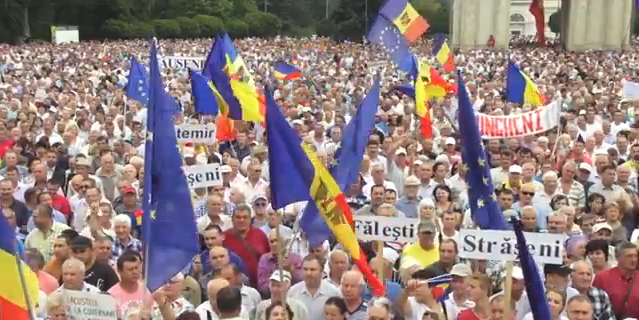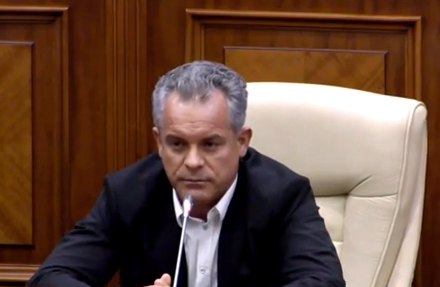The Limits Of Anti-Corruption Protests In Moldova
CHISINAU — The tent city in the center of Moldova’s capital sprung up the evening of Sept. 6, just after a downtown protest had drawn thousands. The demonstrators decided on the spot to stay until they could claim victory; and by nightfall, a few dozen tents had appeared. By the next day there were at least 100.
On a recent day, yet another tent was being set up — and from an unlikely protester. “I worked for the police for 16 years, sometimes even clearing settlements like this,” said the man, who did not give his name. “I’ve tried to go about my business for the past couple months. Now I’m renouncing my duty.”
Another policeman patrolling the square said that he supported the protesters’ demands. “This government is pissing me off.”
The latest protest took place Monday, as an estimated 20,000 people demonstrated against Moldova’s government, days after the International Monetary Fund said it would not negotiate a new loan agreement, the Associated Press reported.
The reasons driving people to protest are familiar: corruption, consumer price increases, electoral fraud and government employees who break the law. The classic cake has its own, particular icing: Last year around 1 billion euros disappeared from three major Moldovan banks. For a small, poor country like Moldova, that’s a huge amount of money.

Sept. 6 protests in Chisinau — Photo: Accent TV screenshot
The money-withdrawal scheme occurred when banks owned by a well-known businessman gave loans to dubious businesses, which then defaulted. The vanished money sparked a currency devaluation after the national bank had to step in, and that led to the rise in prices. The businessman in question has not been prosecuted, nor have any of the people responsible for monitoring banking operations.
“Dignity and Truth,” the citizens’ group behind the current protests, was formed in early 2015 in response to the banking revelations. The most recent protest was the fourth protest the group organized, and the largest gathering in Chisinau in recent memory.
What is unclear is whether the scandal and subsequent protests could lead to a change in government in Moldova. Although Moldovan law does not technically allow early elections, there might be be other ways to force a change.
Since the current government is pro-European, it is likely to pay attention to recommendations from Brussels, which could force the political parties to purge the government of the most compromised officials.
Mark Tkachuk, a former presidential adviser in Moldova, says that the problem goes deeper than simply replacing officials. “You could exchange the “bad” pro-Europeans in Moldova with “good” pro-Europeans, but the problem is that no one in government has any positive ideas or real strategies,” he said. “There’s a lack of personnel.”

Targeted by protests, oligarch Vladimir Plakhotnyuk — Photo: Accent TV screenshot
Cornel Churya, an analyst with the Chisinau Development Institute, thinks that unprecedented early elections could happen. “They can figure out a way to hold the elections. But the government needs to give the protesters something,” he said.
But it’s also entirely possible that the current ruling party would triumph in early elections, after having won in many local elections last June, which shows that their image hasn’t been too damaged by the corruption scandal.
There would also be representatives of “Dignity and Truth,” some of whom would like to ride the wave of popular protest to form a new political party. When the citizens’ group becomes a party, its politics would be right-of-center. Meanwhile, the political party controlled by Vladimir Plakhotnyuk, Moldova’s most powerful oligarch, will edge ever closer to Moscow.
Still, no matter who ends up in power, the most important problems in Moldova will remain unsolved: social polarization, corruption and the country’s weak economic development. Since gaining independence, Moldovan politicians have typically found it easier to fight among themselves than work on the uncomfortable battle with corruption and the boring questions related to development. That, utlimately, is at the center of protesters’ complaints.
29 September 2015
